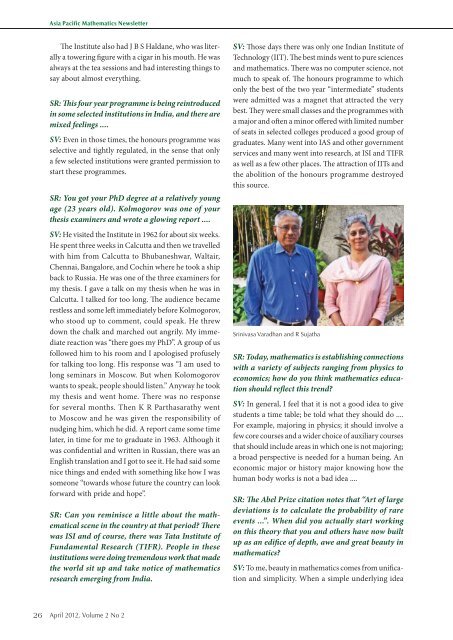Mathematics Newsletter
Mathematics Newsletter
Mathematics Newsletter
Create successful ePaper yourself
Turn your PDF publications into a flip-book with our unique Google optimized e-Paper software.
26<br />
Asia Pacific <strong>Mathematics</strong> <strong>Newsletter</strong><br />
The Institute also had J B S Haldane, who was literally<br />
a towering figure with a cigar in his mouth. He was<br />
always at the tea sessions and had interesting things to<br />
say about almost everything.<br />
SR: This four year programme is being reintroduced<br />
in some selected institutions in India, and there are<br />
mixed feelings ....<br />
SV: Even in those times, the honours programme was<br />
selective and tightly regulated, in the sense that only<br />
a few selected institutions were granted permission to<br />
start these programmes.<br />
SR: You got your PhD degree at a relatively young<br />
age (23 years old). Kolmogorov was one of your<br />
thesis examiners and wrote a glowing report ....<br />
SV: He visited the Institute in 1962 for about six weeks.<br />
He spent three weeks in Calcutta and then we travelled<br />
with him from Calcutta to Bhubaneshwar, Waltair,<br />
Chennai, Bangalore, and Cochin where he took a ship<br />
back to Russia. He was one of the three examiners for<br />
my thesis. I gave a talk on my thesis when he was in<br />
Calcutta. I talked for too long. The audience became<br />
restless and some left immediately before Kolmogorov,<br />
who stood up to comment, could speak. He threw<br />
down the chalk and marched out angrily. My immediate<br />
reaction was “there goes my PhD”. A group of us<br />
followed him to his room and I apologised profusely<br />
for talking too long. His response was “I am used to<br />
long seminars in Moscow. But when Kolomogorov<br />
wants to speak, people should listen.” Anyway he took<br />
my thesis and went home. There was no response<br />
for several months. Then K R Parthasarathy went<br />
to Moscow and he was given the responsibility of<br />
nudging him, which he did. A report came some time<br />
later, in time for me to graduate in 1963. Although it<br />
was confidential and written in Russian, there was an<br />
English translation and I got to see it. He had said some<br />
nice things and ended with something like how I was<br />
someone “towards whose future the country can look<br />
forward with pride and hope”.<br />
SR: Can you reminisce a little about the mathematical<br />
scene in the country at that period? There<br />
was ISI and of course, there was Tata Institute of<br />
Fundamental Research (TIFR). People in these<br />
institutions were doing tremendous work that made<br />
the world sit up and take notice of mathematics<br />
research emerging from India.<br />
April 2012, Volume 2 No 2<br />
SV: Those days there was only one Indian Institute of<br />
Technology (IIT). The best minds went to pure sciences<br />
and mathematics. There was no computer science, not<br />
much to speak of. The honours programme to which<br />
only the best of the two year “intermediate” students<br />
were admitted was a magnet that attracted the very<br />
best. They were small classes and the programmes with<br />
a major and often a minor offered with limited number<br />
of seats in selected colleges produced a good group of<br />
graduates. Many went into IAS and other government<br />
services and many went into research, at ISI and TIFR<br />
as well as a few other places. The attraction of IITs and<br />
the abolition of the honours programme destroyed<br />
this source.<br />
Srinivasa Varadhan and R Sujatha<br />
SR: Today, mathematics is establishing connections<br />
with a variety of subjects ranging from physics to<br />
economics; how do you think mathematics education<br />
should reflect this trend?<br />
SV: In general, I feel that it is not a good idea to give<br />
students a time table; be told what they should do ....<br />
For example, majoring in physics; it should involve a<br />
few core courses and a wider choice of auxiliary courses<br />
that should include areas in which one is not majoring;<br />
a broad perspective is needed for a human being. An<br />
economic major or history major knowing how the<br />
human body works is not a bad idea ....<br />
SR: The Abel Prize citation notes that “Art of large<br />
deviations is to calculate the probability of rare<br />
events ...”. When did you actually start working<br />
on this theory that you and others have now built<br />
up as an edifice of depth, awe and great beauty in<br />
mathematics?<br />
SV: To me, beauty in mathematics comes from unification<br />
and simplicity. When a simple underlying idea


